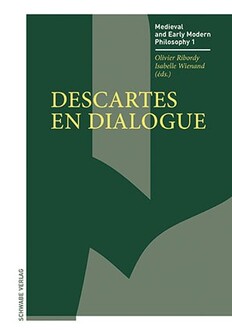The book series Medieval and Early Modern Philosophy (MEMP) is committed to publishing first-rate scholarly work on philosophical thought from the 12th century to the end of the 18th century. It deliberately adopts the view that the development from medieval to early modern thought was primarily shaped by continuities and gradual changes rather than ruptures and revolutions. The series is broad in its thematic outlook in that it accepts contributions on thinkers from various religious and non-religious traditions. It encourages innovative scholarship that opens up new perspectives on canonical authors as well as investigations into the work of less known figures, including women philosophers.
The distinguished editors of the series assure high quality of the publications in the series. All book proposals are peer-reviewed. The series speaks to an international audience and accepts contributions in English, German and French. The multilinguality of the series represents the view that multifarious linguistic competency is essential to high-quality research on the period. Apart from research monographs, thematic edited volumes and commented translations are welcome to be included in the series.
Le volume Descartes en dialogue illustre la richesse intellectuelle et la variété thématique des sujets abordés par Descartes au travers des lettres qu’il adresse à de nombreux correspondants comme la princesse Élisabeth de Bohême, le diplomate Pierre Chanut, les philosophes Thomas Hobbes et Henry More, ainsi que le jésuite Denis Mesland. De plus, certaines lettres fournissent l'occasion à Descartes de s'exprimer sur les thèses du mathématicien et astronome Ismaël Boulliau. Cette publication met surtout en exergue la valeur philosophique de la correspondance et son importance pour l’intelligence de la pensée cartésienne. De plus, une galerie des principaux portraits de Descartes, réalisés au XVIIe siècle, permet de visualiser certains traits attribués au philosophe par ses contemporains.
L’ouvrage contient les contributions originales de Delphine Bellis, Erik-Jan Bos, Frédéric de Buzon, Richard Glauser, Denis Kambouchner, Marie-Frédérique Pellegrin, Olivier Ribordy, Angela Schiffhauer, Lisa Shapiro, Tiziana Suarez-Nani, Isabelle Wienand et Benno Wirz.
MEMP Vol. 2: Khaled El-Rouayheb: The Development of Arabic Logic (1200–1800)
Recent years have seen a dramatic change in scholarly views of the later career of Arabic and Islamic philosophy. For much of the twentieth century, researchers tended to dismiss the value of Arabic writings on philosophy and logic after the twelfth century, often on the basis of the prejudice that handbooks, commentaries and glosses are of necessity pedantic and unoriginal. This assumption has now been abandoned. As a consequence, a vast amount of later Arabic writings on philosophy and logic, hitherto neglected, are now being studied and edited.
The present work is an attempt at giving an overview of the development of Arabic logic from 1200 to 1800, identifying major themes, figures and works in this period, while taking into account regional differences within the Islamic world. It offers a corrective to Nicholas Rescher’s seminal but now outdated The Development of Arabic Logic, published in 1964.
Indem Locke die Unterscheidung zwischen deutlichen und verworrenen Ideen auf eine neue Weise auffasst, nämlich auf Sprache bezogen, entwickelt er einen sprachphilosophischen Zugang zu metaphysischen Fragen. Dies erlaubt es ihm, die traditionellen metaphysischen Grundbegriffe des Wesens, der Identität und der Substanz neu zu fassen – und sie mit seiner empiristischen Erkenntnistheorie in Einklang zu bringen. Auf der Grundlage einer solchen Interpretation lässt sich zeigen, so die Kernthese von Im Namen der Dinge, dass Lockes verstreute metaphysische Überlegungen eine kohärente metaphysische Theorie des Wesens der Dinge bilden. Entgegen einer weitverbreiteten Einschätzung erweist sich Locke damit als Philosoph, der die metaphysischen Systeme der späten Scholastik und der frühneuzeitlichen Rationalisten nicht nur kritisiert, sondern auch auf eine sehr interessante Weise weiterentwickelt hat.
